
Assembly required – 55 sales tools to build the ultimate tech stack
Main illustration: Liz Meyer
Table of contents:
- How to choose your sales tools 2 min
- The six types of sales tools 1 min
- Customer relationship management (CRM) tools 2 min
- Sales and market intelligence tools 2 min
- Lead handling and prospecting tools 3 min
- Analytics and reporting tools 2 min
- Process and training tools 2 min
- Automation and integration tools 2 min
- Why live chat gets overlooked on lists of sales tools 1 min
As your sales organization grows, your tech stack almost always does too. But figuring out which sales tools you should buy and invest in – let alone understanding what each tool even does – can be a daunting task.
This is especially true when you consider the seemingly endless list of sales tools to choose from. With 1,078 vendors in the sales tech space and more being added daily, building your sales tech stack can quickly become an overwhelming exercise, even for the most experienced in sales operations.
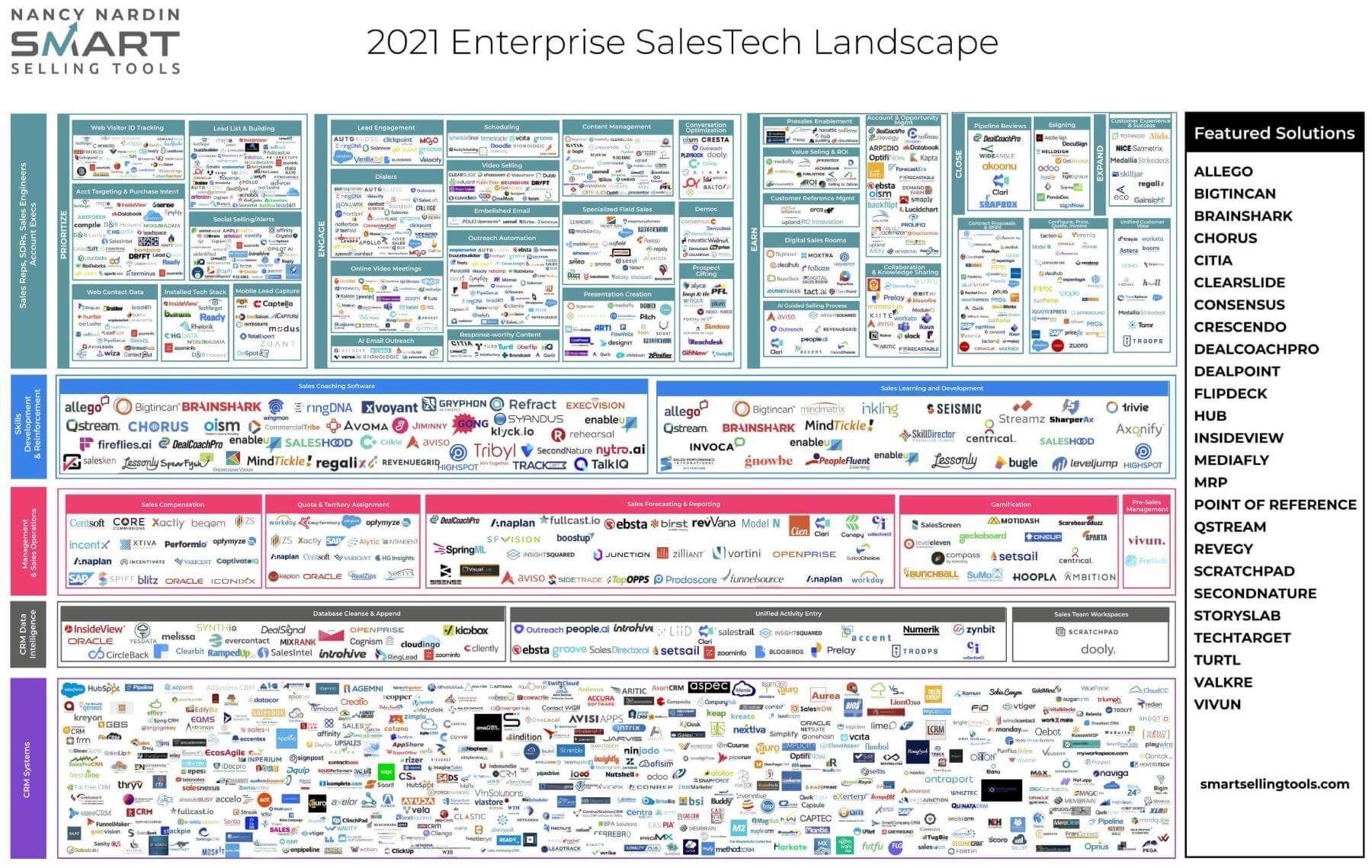
Image credit: Nancy Nardin’s smart selling tools
Recent research from Gartner shows that 80% of B2B sales interactions between suppliers and buyers are expected to occur in digital channels by 2025 – signalling a shift from the traditional reliance on sales reps to a need for digital solutions like automation, live chat, and conversational marketing in the long term.
“As customers increasingly learn and buy digitally, sales reps become just one of many possible sales channels,” says Cristina Gomez, Managing Vice President at Gartner. “Because of this, sales organizations must be able to sell to customers everywhere the customer expects to engage, interact, and transact with suppliers.”
But what does this mean for you and your business? Building a flexible sales stack helps maintain sales efficiency and sales effectiveness while also meeting the demands of modern buyers – even as you scale.
Below we take a closer look at the best frameworks for guiding your sales tool selection and our recommended sales tools to accelerate your sales motions, increase revenue, and boost ARR in 2021. But first, let’s start with a simple definition.
What are sales tools?
Sales tools are applications and software used by sales professionals to make their job easier. Sales tools come in multiple categories, including customer relationship management (CRM), sales and market intelligence, lead handling and prospecting, analytics and reporting, sales training, and sales automation and integration. Choosing the right tools ensures efficient and effective performance from your team and ultimately creates happier customers.
How to choose your sales tools
As you begin to build your sales stack, it’s important to consider what each tool accomplishes and how they work together. Measuring twice and cutting – or in this case, implementing – once is easy advice to overlook. Not all companies have the same needs and they can vary. If you’re selling a high-volume, freemium product, you may benefit greatly from a single tool that can automate manual tasks like lead qualification. An enterprise software company, on the other hand, may need a robust suite of integrated tools to help them manage longer, multitouch sales cycles.
“When buying tools or designing frameworks consider what the process looks like from the customer’s perspective and keep their needs at the heart of your decisions”
While it’s common sense that not all sales tools are created equal, it’s also true that not all companies have the same needs. Before you start contacting vendors, the first thing you should do is make a list of your core business needs. Once you’ve done this, you need to see if your customers’ needs align with these. When buying tools or designing frameworks consider what the process looks like from the customer’s perspective and keep their needs at the heart of your decisions. Then, use that list to evaluate potential solutions.
As we emerge from the COVID-19 crisis it’s important to select tools that will allow you to adapt to changing buyer behavior. Remember you can’t build your sales stack on the back of “nice-to-haves.” Most software vendors will want to impress you with all the things their product can do, but making sure the tool meets your critical business needs while aligning with your customer’s needs should be paramount.
Simple frameworks for choosing your sales tools
Picking the right sales tools can be an easy process if you use the right frameworks to guide your selections. These frameworks can be as simple as a few statements reminding you what a tool should and shouldn’t do – for example, a tool should help you accomplish a goal like improving productivity, but it shouldn’t create more work for the reps using it.
Here are some simple suggestions as you design your own framework:
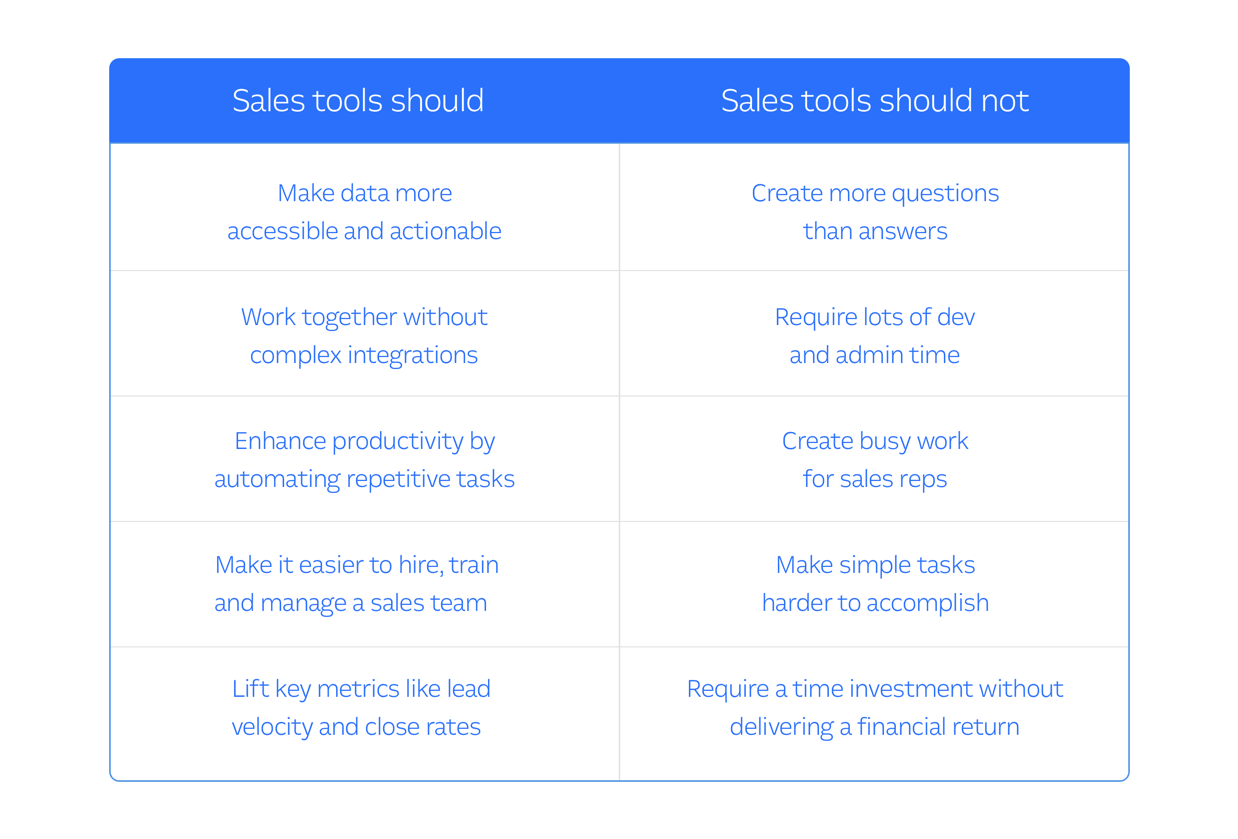
Another framework we’ve found useful is breaking down the work that needs to be done and then seeing what kind of tool is needed to level up. Put simply:
- Work that is high in value and requires a high touch should be accelerated.
- Work that is high in value but is low touch should be assisted.
- Work that is low in value and requires a high touch should be automated.
- Work that is low in value and requires low touch should be eliminated.
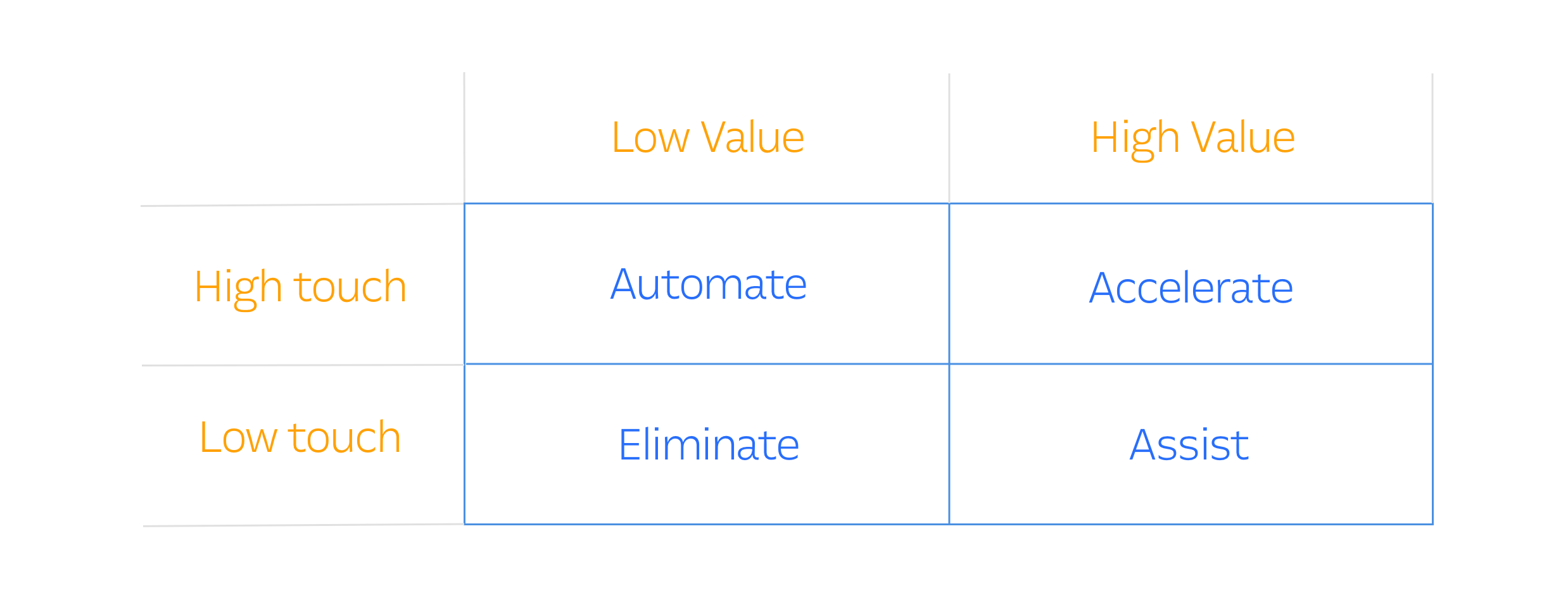
Putting this framework into practice might look like:
- Automate repetitive tasks like qualifying leads by using a chatbot to automatically engage high-value website visitors.
- Accelerate your sales cycle by using live chat, instead of email or phone, to talk to leads when they’re most engaged – on your website.
- Assist sales reps in the buying process by using a data enrichment tool like Clearbit to populate relevant information about your lead and their company.
- Eliminate low-value work by creating self-serve resources like a smart knowledge base that can quickly serve up answers to frequently asked questions.
Remember any sales tool that you choose should either increase value or decrease time – and ideally both
The six types of sales tools
Most sales tools are either a CRM (Customer Relationship Management) or CRM enhancers – they add a specialized functionality to your existing CRM, or they feed data into it. The six most common categories that sales tools fall under are:
- Customer relationship management (CRM)
- Sales and market intelligence
- Lead handling and prospecting
- Analytics and reporting
- Process and training
- Automation and integrations
The 55 best sales tools
I’ve organized this list using the six categories above. At the top of each category are the tools we use at Intercom, but I’ve included plenty of alternatives that might be just as good, or even better, for your business’s needs.
Customer relationship management (CRM) tools
Your CRM is the center of your sales process. Choose one that facilitates a better workflow and integrates with the rest of your sales stack. This is the most important tool you’ll invest in, so it may come as no surprise that the CRM category consists of 461 tools in the sales tech landscape, so carefully assess your needs and then choose the CRM that will grow with your organization.
1. Salesforce
We use Salesforce because they are the industry leader among CRMs. The platform is easy to customize, accessible from almost anywhere, has a robust report engine and offers numerous integrations, including the ability to sync data from tools that don’t talk directly to one another.
Additionally, with the Salesforce app for Intercom, we can keep our users in Intercom and leads and contacts in Salesforce synced. That way, our reps can move seamlessly between tools without sacrificing the customer experience.
Alternatives: ActiveCampaign, monday.com
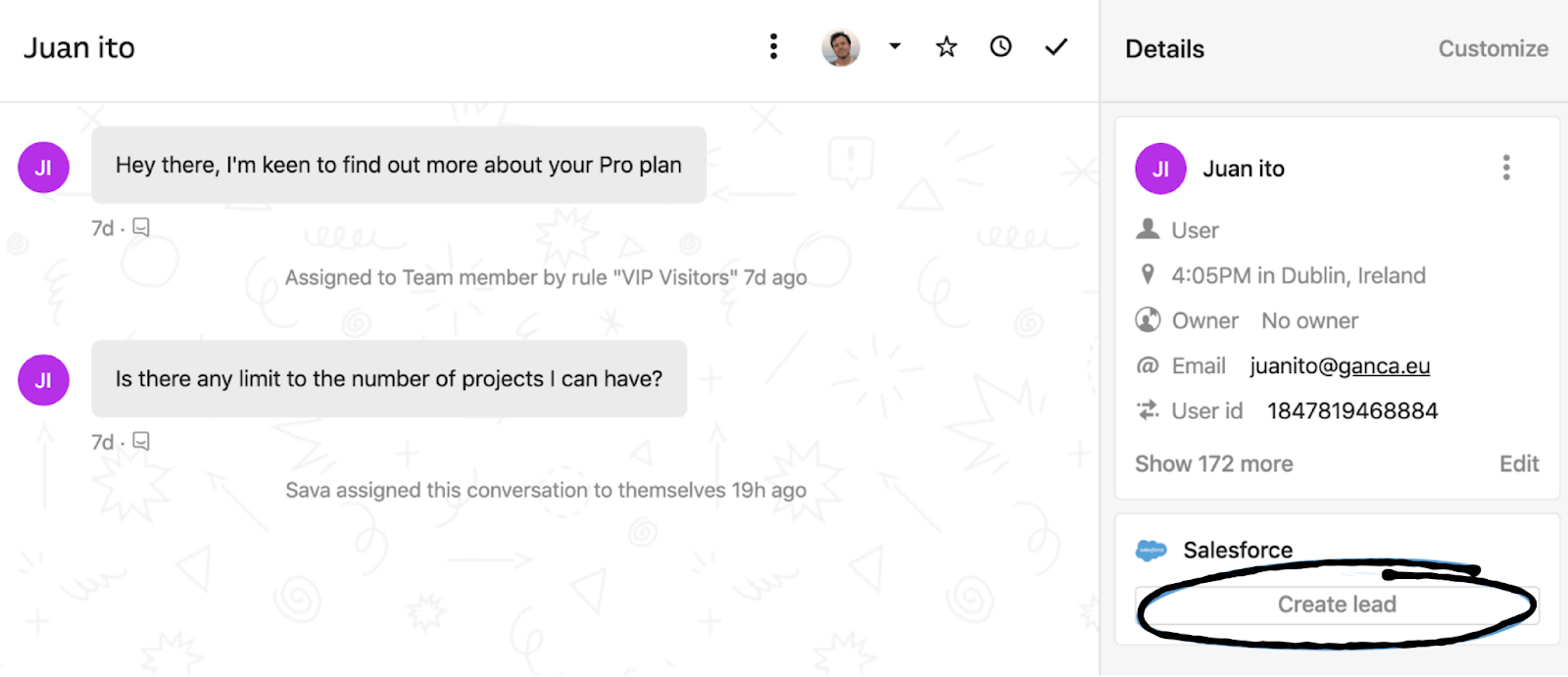
2. Zoho CRM
Zoho CRM is a customizable tool that works for B2B and B2C organizations of all sizes, helping them to convert more leads, engage with customers, and grow revenue with ease.
Alternatives: Sharpspring, Yesware
3. Copper
Copper was built for G Suite users but with the native Intercom app, you can quickly track data, schedule meetings, and create and view opportunities without ever leaving the Inbox.
Alternatives: Sugar Sell, Streak
4. HubSpot Sales Hub
You can upgrade for advanced features, but the basic version of the HubSpot Sales Hub is free forever and works well for new teams. It also seamlessly integrates with Intercom, allowing you to access important HubSpot data on leads and customers right from the Intercom Inbox.
Alternatives: Close.io, Outreach
5. Pipedrive
Another widely used CRM tool, Pipedrive helps you reduce administrative overhead with their workflow automation feature. Integrate with Intercom to seamlessly sync deals, leads, and conversations to capture and convert more leads.
Alternatives: Agile CRM
6. Keap
Keap is a sales CRM and marketing tool that helps you to collect more leads with high-converting landing pages, engage prospects with targeted messages, and create custom forms that embed on your website and landing pages to capture lead information.
Give SDRs the information they need to close deals right from within their Intercom Inbox with our Keap integration.
Alternatives: Sales seek
7. Dynamics 365 Sales
Dynamics 365 Sales is a robust solution from Microsoft that provides applications for each stage of the buyer’s process, from sales intelligence to personalized buyer experiences. You can integrate Dynamics 365 Sales with Intercom to access quotes & orders, view real-time sales, and quote information during the Intercom Inbox and create contacts from inside Intercom.
Alternatives: PipelineDeals, Pipeliner CRM
8. Salesloft
Salesloft is a sales acceleration and CRM platform that helps B2B sales teams capture leads and close more deals.
“Your SDRs can use our integration to get access to Salesloft from the Intercom inbox”
You can automate interactions with buyers or personalize them across email, phone, social, direct mail, and video to engage customers in a way that works best for them. Your SDRs can use our integration to get access to Salesloft from the Intercom inbox.
Alternatives: Nimble, Insightly CRM
Sales and market intelligence tools
Knowing a prospect’s name or email is a great start, but these alone don’t tell you if that person or their company will be a qualified buyer for your product. Sales and market intelligence tools help fill in the details so you can quickly make informed sales decisions.
9. Clearbit
We use Clearbit to enrich visitors who chat with us via our Messenger but only leave behind a few points of information, like full name and email address.
“With the Clearbit Reveal app for Intercom, we can uncover things like company name, location and employee count”
With the Clearbit Reveal app for Intercom, we can uncover things like company name, location and employee count. Then we can decide if we think the company is a good fit for our products and use cases.
Alternatives: Lead411, UpLead
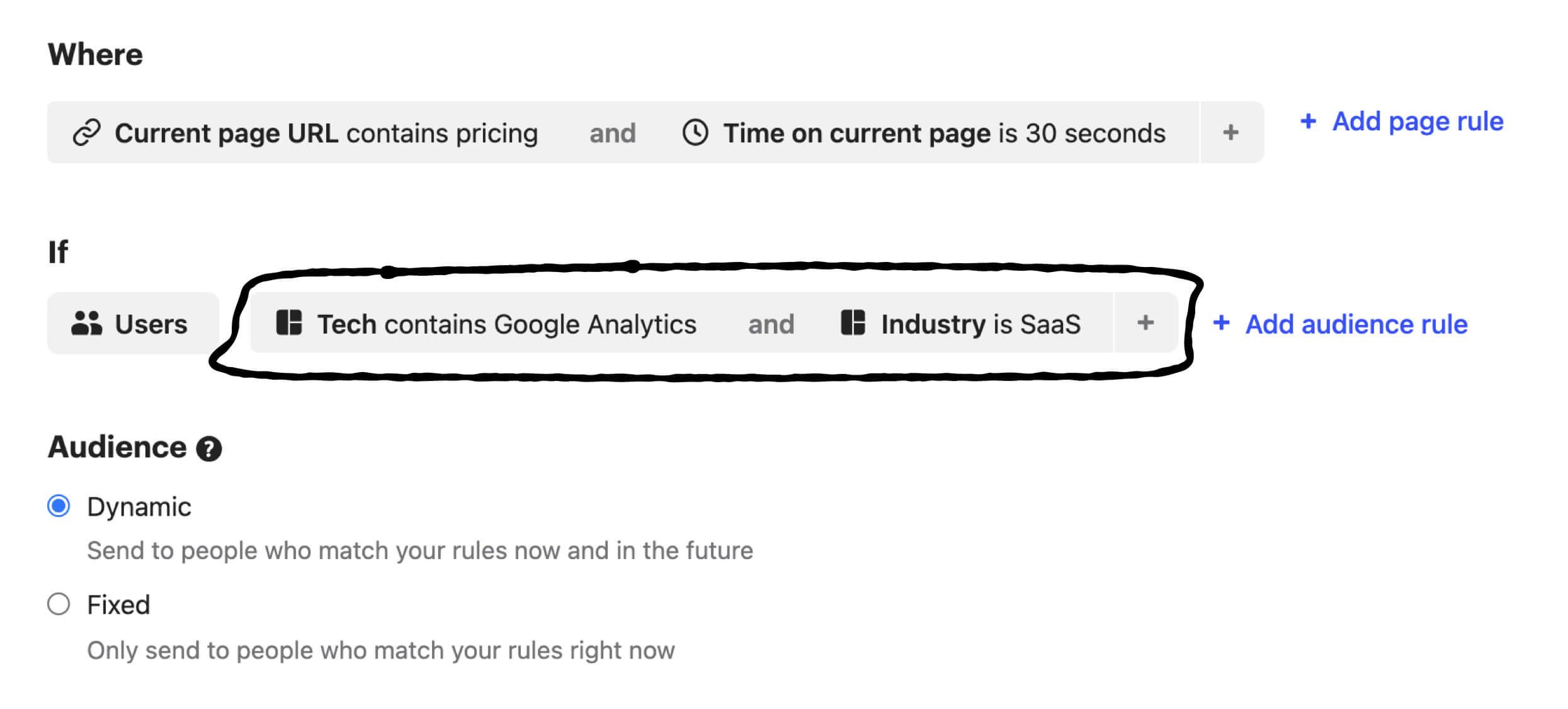
10. LeadGenius
Need some people power behind your lead searches? LeadGenius combines the power of machine learning with the intuition of human researchers. LeadGenius helps us ensure the quality of the lead data you’re piping into your CRM.
Alternatives: Datanyze, D&B Hoovers
11. ZoomInfo
We use ZoomInfo to make sure we have accurate contact information in our CRM. This tool allows us to search for companies and prospects based on industry, location, company size, revenue, and more to understand how our prospects and customers have changed over time.
Alternatives: Sales Intel
12. LinkedIn Sales Navigator
LinkedIn Sales Navigator allows us to tap into their massive network to learn more about our prospects and identify key decision makers.
Alternatives: Lusha, LeadIQ
13. Groove
Groove is a lean, omnichannel help desk that helps teams focus on delivering personal support. Quickly route, tag, or create canned replies to quickly resolve your most common queries.
Alternatives: XANT playbooks, Adapt
14. 6Sense
Generate more opportunities, get deals sooner, and increase deal size with the 6Sense account engagement platform.
“6Sense uses AI predictions to tell you when people are ready to buy so you can leverage intent data and rich insights that allow you to proactively target the right accounts to close more deals”
6Sense uses AI predictions to tell you when people are ready to buy so you can leverage intent data and rich insights that allow you to proactively target the right accounts to close more deals.
Alternatives: VanillaSoft, Velocify
15. MadKudu
This powerful tool matches demographics with behavioral data to identify and score the best leads. Madkudu seamlessly integrates with Intercom.
Alternatives: Leadspace, PipeCandy
16. Leadfeeder
Turn anonymous Google Analytics visits into actionable sales data. Leadfeeder reveals the companies that your website visitors work for so you can look for matches in your CRM.
Alternatives: Kickfire, Albacross
17. Infer
Infer is an artificial intelligence SaaS platform that leverages machine learning for predictive lead and account scoring. Hyper-segmentation of profiles enables you to personalize your sales motions and identify your most sales-ready leads.
Alternatives: EverString
18. Prospect.io
Find prospects on social media or spreadsheets, and then let Prospect.io find their email address. It also includes tools for automated outreach campaigns and integrates with Intercom using the piesync app.
Alternatives: Slintel, Autopilot
Lead handling and prospecting tools
Perhaps the most important part of any sales motion is quickly identifying promising leads, qualifying them and getting them into the right hands to be nurtured and converted into a sale. The tools below will help you do just that.
19. Intercom live chat
At Intercom, our sales reps use live chat to proactively engage, qualify, and convert website visitors in real time. We can even hop on a discovery call, demo our product, or schedule a follow-up meeting with high value leads while they’re live on our website. With our growing App Store, Intercom can now be connected to hundreds of other tools, making it an even more valuable player in our sales stack.
Alternatives: None 😉
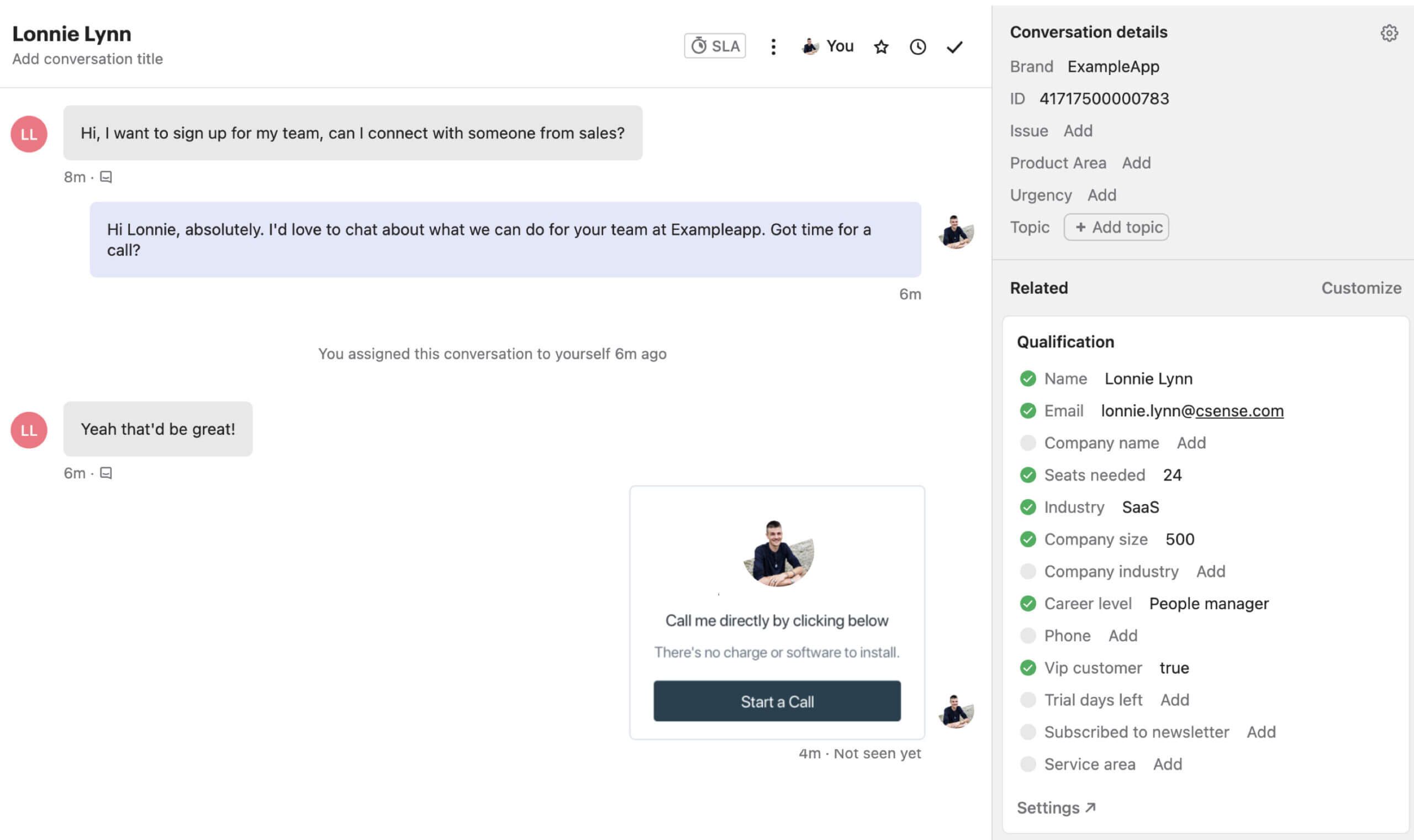
20. LeanData
LeanData is a powerful tool that helps us route leads to the right rep and attribute new business to sales and marketing campaigns. The drag-and-drop functionality means we can quickly build complex routing logic for leads and contacts along with opportunities and accounts. We can also create and edit round robin logic, establish territories, and put reps on vacation to make sure prospects are never left waiting.
Alternatives: Bizible, Marketo Engage
21. Salesloft
Salesloft allows us to streamline, automate and quickly personalize our sales outreach. For prospects that don’t come in through live chat, we use Salesloft to put them into an email cadence and proactively follow up with them to gauge their interest.
Alternatives: PersistIQ
22. Demandbase
Demandbase is an ABM platform that provides a 360 overview of your accounts so you can engage the right people with the right message at the right time.
Alternatives: Rollworks
23. Aircall
This is a complete solution for sales teams making outbound calls. Aircall includes everything from call recording to data analysis to CRM integrations and works right in the Intercom Messenger.
24. Chili Piper
Chili Piper is an advanced scheduling software for time-strapped sales teams.
“Chili Piper routes conversations to the right team and round robin rules ensure leads are fairly distributed across team members to ensure a positive customer experience”
It allows SDRs to schedule customer meetings and sync them with their CRM in a single click – translating to more time to focus on more valuable interactions with leads and prospects. Chili Piper routes conversations to the right team and round robin rules ensure leads are fairly distributed across team members to ensure a positive customer experience. Schedule them straight from your Intercom Inbox with our handy integration.
Alternatives: Terminus ABM Platform
25. Bonjoro
Hook Bonjoro up to Intercom (or your CRM of choice), then get a prompt to send a quick, personalized video to each new lead. It all happens in Bonjoro’s mobile app, making it easy to add a human touch to the sales process.
Alternatives: Loom, Vidyard
26. CloudSponge
Andrew Chen cited workplace collaboration apps as a prime candidate for network effect growth tactics.
CloudSponge enables users to tap into address books to invite colleagues to collaborate with them so you can generate more leads and referrals.
Alternatives: Skrapp.io
27. DocSend
Sales collateral is now in the cloud and easy to track. Use DocSend to send case studies, presentations and other content – and then track prospect engagement in its dashboard.
Alternatives: GetAccept
28. Mailshake
Mailshake is a cold-email outreach tool that includes sales email templates and automatic follow-ups.
Alternatives: BuzzSumo
29. Outreach.io
This is a tool that helps you build an outreach process. Outreach.io uses a feature called Sequences to drive further engagement with prospects. These workflows keep reps on tasks so that no lead is ever forgotten.
Alternatives: RingDNA
30. Wistia
Wistia allows users to record their webcam and their screen.
“With the Wistia app, you can send your leads and video data straight into Intercom”
Make your pitch or give a demo, then share the video with a link. With the Wistia app, you can send your leads and video data straight into Intercom.
Alternatives: Brightcove, Dolby.io
31. GetAccept
GetAccept allows you to create video prospecting messages, sales enablement content including sales decks and case studies, and live chat messages to engage prospects. Workflows allow you to effortlessly send documents and capture e-signatures from clients.
Analytics and reporting tools
Data is next to useless until it’s actionable. These tools allow you to visualize, scrutinize and mobilize decision making by making data accessible by stakeholders in impactful ways.
32. Google Analytics
Is it any surprise that Google Analytics made this list? This powerful analytics tool is used by sales teams to identify where leads bounce, the content they’re engaging with the most, how they found you, and where they are coming from to allow your team to identify new opportunities to engage prospects or strengthen sales enablement content to help reduce churn.
Alternatives: Adobe Analytics
33. Heap
Heap is a powerful analytics tool that contextualizes user actions with behavioral analytics to help sales teams make more impactful decisions.
“Sales teams can leverage Heap to identify the actions and behaviours that produce long-term retention and increase activation rates”
Their software empowers product, marketing, and customer success teams to understand their users’ behaviors so they can provide a frictionless experience. Sales teams can leverage Heap to identify the actions and behaviors that produce long-term retention and increase activation rates.
Alternatives: Looker
34. InsightSquared
InsightSquared equips sales operations with actionable, real-time intelligence on sales KPIs. This tool powers more accurate forecasting, pipeline management, and customized sales rep coaching based on individual performance.
Alternatives: Aviso
35. Tableau
Tableau is critical to enabling those of us in sales operations to see and understand our data. We’ve connected Tableau to a variety of data sources, including our CRM, our backend data warehouse and our Intercom app, so we can visualize a treasure trove of customer data. Tableau allows us to process a lot of data, which is important as we scale.
Alternatives: InsightsSquared, Domo
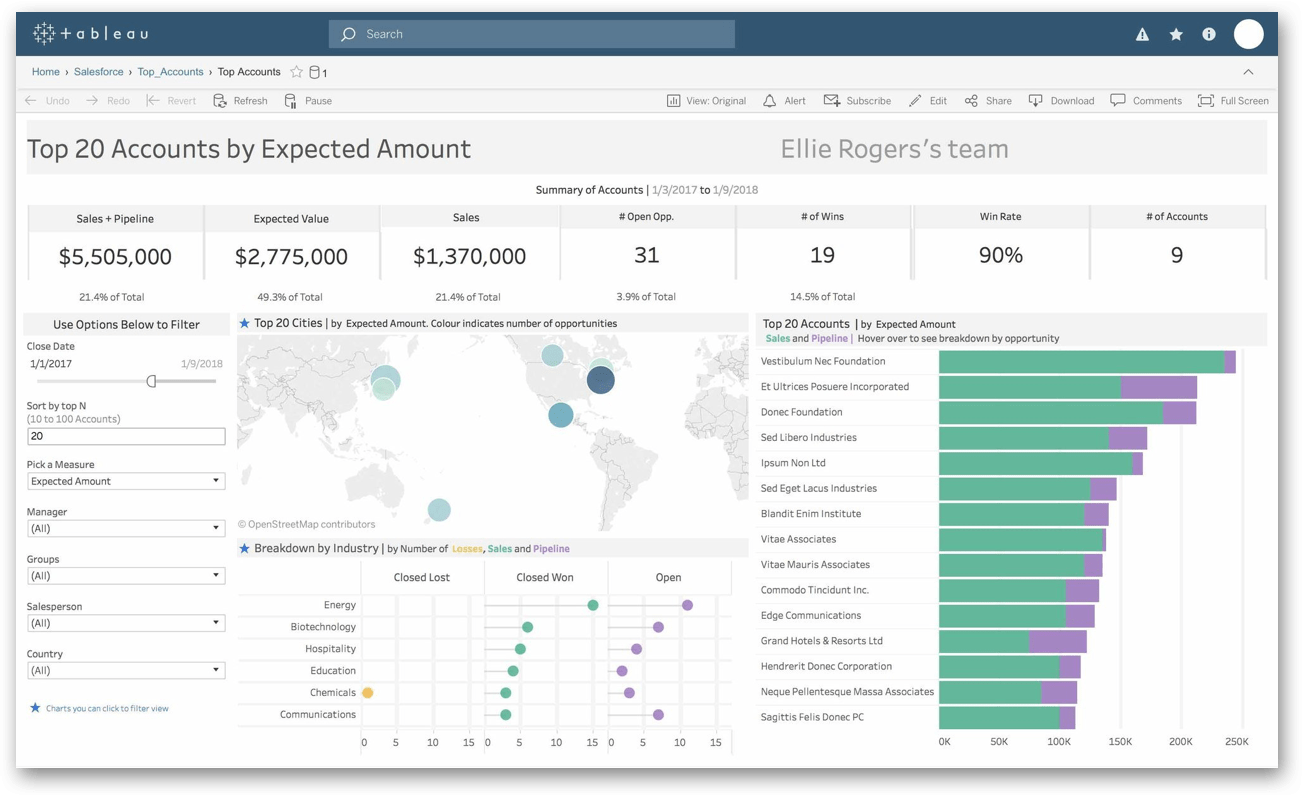
36. Bombora
Using Bombora, we have the ability to understand which of our prospects are actively searching for Intercom and pair that with firmographic information. Bombora makes it easy for us to uncover the key decision makers we should be reaching out to and move deals forward.
Alternatives: SignalHQ
37. Clari
Clari allows you to gamify the sales process to boost rep productivity. The tool also provides insights on buyer intent so you can more accurately create sales forecasts and help your team track toward closing business.
Alternatives: People.io
38. FullStory
Record every visitor session on your website, then rewatch and analyze to see where they get stuck. FullStory is great for customer support, but sales teams can use the FullStory app for Intercom to look for missed opportunities in content marketing, lead capture forms pricing pages, and more.
Process and training tools
Improving your most common sales processes can save your team immense time – and headaches. These tools help you reduce friction, speed up common tasks, and onboard new sales team members quickly.
39. Gong
Gong captures all of our prospect calls, video meetings, and emails to help us understand how deals are progressing and what our reps could be doing better. Gong uses conversational intelligence to understand what’s being said – things like if a competitor was mentioned or how a discount request was handled. We use it to monitor calls that our new sales reps make so we can offer advice on how to best sell our product.
Alternatives: Chorus.ai, VoiceOps
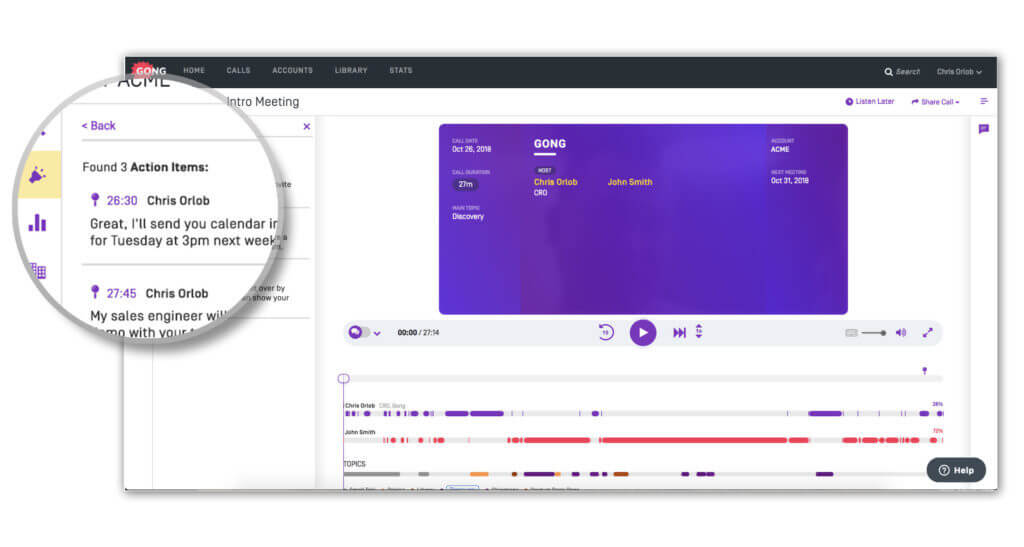
40. DocuSign
Let’s be honest: most customers would scoff if you asked them to print, sign, scan and email (or even worse, fax) a document back to you. That’s why we’re big fans of DocuSign’s e-signature tools. We use it to complete order forms and master service agreements (MSAs) in hours, not days, from almost anywhere in the world, which helps since we’re a global company. We have our templates synced to our CRM so reps can send contracts directly to prospects with opportunity details like product and pricing information populating automatically on the forms.
Alternatives: PandaDoc
41. Dooly
Every business, including ours, wants a synopsis of what happened during a sales interaction, but what we don’t want is our reps wasting time logging task after task. That’s where Dooly comes in. It’s a task management tool that allows our reps to quickly sync meeting notes to our CRM by clicking a link in their calendar meeting invite.
Alternatives: Seismic
42. Guru
Guru provides one source of truth for all our collective sales knowledge. Our Sales Enablement team loves the ability to empower our organization with best practices and give our sales reps an easy way to understand our sales plays at a glance.
Alternative tools: Bloomfire
43. Chorus.ai
Chorus.ai allows SDRs to record and transcribe sales calls for better documentation in your CRM.
Alternative tools: Jiminny
44. Droplr
Droplr is one of those tools that nearly anyone can benefit from. Capture and annotate screenshots, record screencasts, and drop them right into your Intercom conversations.
Alternative tools: CloudApp, Snagit
45. HelloSign
For deals that require a contract or statement of work to be signed, HelloSign is essential. Electronic signatures remove quite a bit of friction from the closing process.
Alternative tools: eversign, SignRequest
46. Process Street
Turn all of your processes into checklists. Process Street is a great way to document and share onboarding flows with employees and new customers.
Alternative tools: Kissflow
47. Typeform
Just about every company uses contact forms in some way.
“Typeform allows you to quickly collect customer information with beautiful, interactive surveys”
Typeform allows you to quickly collect customer information with beautiful, interactive surveys. With the Typeform app, you can ask for user feedback directly in the Intercom Messenger.
Alternative tools: Survicate, SurveySparrow, JotForm
Automation and integration tools
What’s better than a top-performing sales team? Allowing that team to get more done with smart automation. Whether it’s pre-qualifying leads, instantly answering a support question, or connecting data from disparate sources, automation and integration tools allow teams to go from good to great by creating efficiencies in the sales workflow.
48. Custom Bots from Intercom
Custom Bots, Intercom’s chatbots for sales, have helped us supercharge our sales pipeline. Our bots can initiate conversations with high-value website visitors and handle lead qualification and routing. What’s made these bots most valuable for us is that we can create custom paths using visitor data so every lead is directed to the right outcome, whether that’s booking a demo, signing up for a webinar, or chatting with a sales rep in real time.
Alternative tools: No need to look any further. 😉
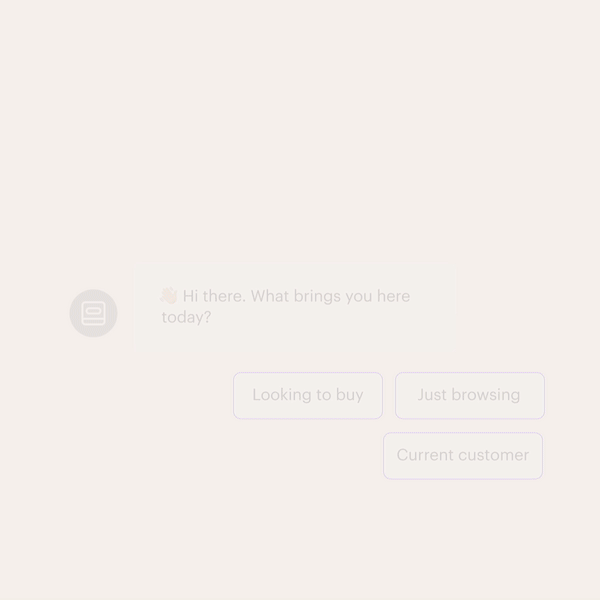
49. Stitch
A cross between Zapier and Segment, Stitch makes it easy to group data in one place. For rapidly growing companies with multiple data sources that are difficult to aggregate, Stitch provides a foundation for giving sales reps the insights they need.
Alternative tools: Fivetran, Xplenty
50. AWS Glue
Similar to Stitch, AWS Glue makes it simple and cost-effective to categorize your data, and move it reliably between data sources.
Alternative tools: Informatica PowerCenter
51. Workato
Workato is an intelligent automation platform that provides a single platform for integration and workflow automation. It connects the entire customer journey to provide a holistic overview of your customers, allowing you to personalize your pitch and tailor it to your customers’ specific needs.
Alternative tools: Jitterbit, Celigo
52. Tray.io
Tray.io pushes data to your CRM to surface notable customer events, such as when a customer increases their overall in-product engagement or grows their account spend. The visual editor means anyone on sales operations, not just technical teammates, can automate complex workflows.
Alternative tools: Integrately
53. PieSync
With PieSync, you can automatically share customer contacts between your marketing automation, CRM, email marketing, invoicing, and e-commerce apps.
“Use the PieSync app for Intercom to keep your leads and users in a two-way sync with your tools”
Use the PieSync app for Intercom to keep your leads and users in a two-way sync with your tools. It integrates seamlessly with Mailchimp, Zoho CRM and more.
Alternative tools: Mulesoft Anypoint Platform
54. Segment
Segment enables integration of event data from various tools – Intercom, Google Analytics, Mixpanel, your CRM and so many others – in one place.
Alternative tools: OneTrust, Emarsys
55. Zapier
Out-of-the-box integrations aren’t always enough. Zapier allows users to trigger workflows that pass data from one app to another. It’s an essential automation tool for sales. With our handy integration, you can integrate it effortlessly with Intercom.
Alternative tools: Automate.io, IBM app connect
Why live chat gets overlooked on lists of sales tools
It’s common sense that having conversations with your prospects is highly valuable and the more opportunities you have to connect with a lead, the better. That’s because live chat enables a one-to-one, real-time interaction with website visitors.
In the past, live chat had an unavoidable association with customer support which impacted it’s popularity as a tool among SDRs – sales reps want to close more deals, not answer a laundry list of questions (as important as that might be to your customers and your support team).
“Think of live chat as a sales tool that eliminates repetitive work and creates a better user experience for your leads”
Since the onset of the pandemic, live chat is up 23% and video conferencing is up 40% – the reality is that buyers now expect an on-demand experience, one that’s best provided through live chat, and they won’t settle for anything less. 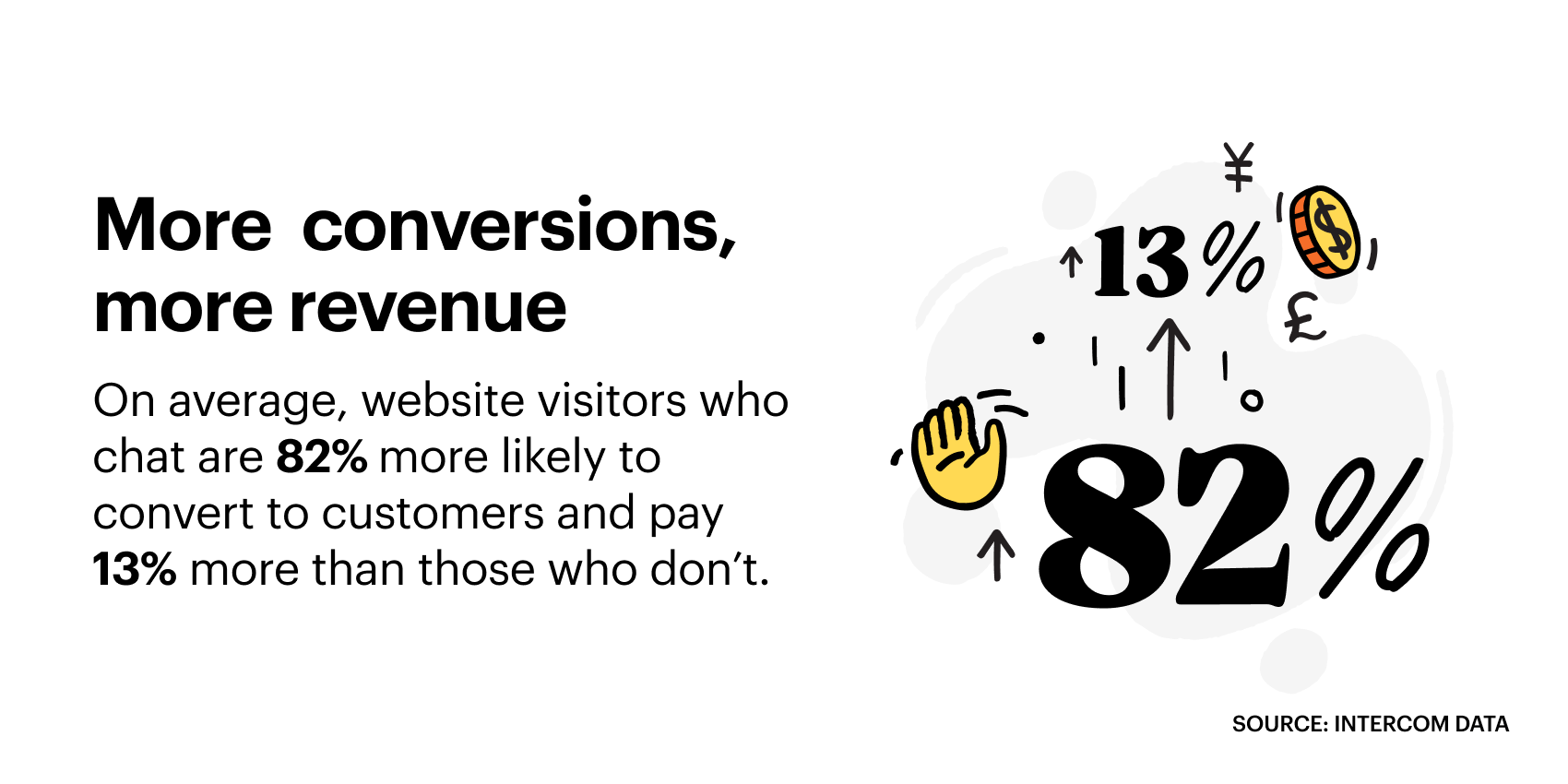
For businesses, this means they should invest in a conversational marketing strategy, one that leverages chat to convert visitors on their site in real-time. Website visitors who chat are 82% more likely to convert to customers and pay 13% more than those who don’t.
Here are a few other things you should know about Intercom’s live chat tool to power your conversational marketing:
- You’ll always be closing. Chatbots can help facilitate real-time conversations with your leads when you’re available but can also capture and qualify leads when you aren’t.
- You can automatically drive leads to the right outcomes. With a little help from a bot, prospects can qualify themselves, get their questions answered, and even take the next step like scheduling a demo or signing up for your newsletter.
- Live chat fits neatly into your existing workflow thanks to our robust suite of integrations.
- Customers love it. In just one month, our friends at LiveStorm increased the number of monthly inbound demos booked by 233%.
Think of live chat as a sales tool that eliminates repetitive work and creates a better user experience for your leads. It hasn’t made its way on to every list of sales tools yet, but it’s one that every top-performing sales team will need in their toolkit sooner rather than later.
Grow your business with the right sales tools
There are plenty of great tools available, many of which we’ve listed here. We’re aware that this list isn’t comprehensive – we didn’t cover dialers, activity tracking tools or contract management tools, for example – and that other sales teams will have their own list of recommendations. However, the tools we did choose are trusted by our customers and our own team.
The ultimate takeaway here is that the right sales tools will help improve your team’s attainment and overall performance. Find the parts of your sales cycle that need attention, carefully assess which tools best fit your needs, and keep your customers’ needs at the center of your decision to build an integrated tech stack that’ll fuel faster growth.







